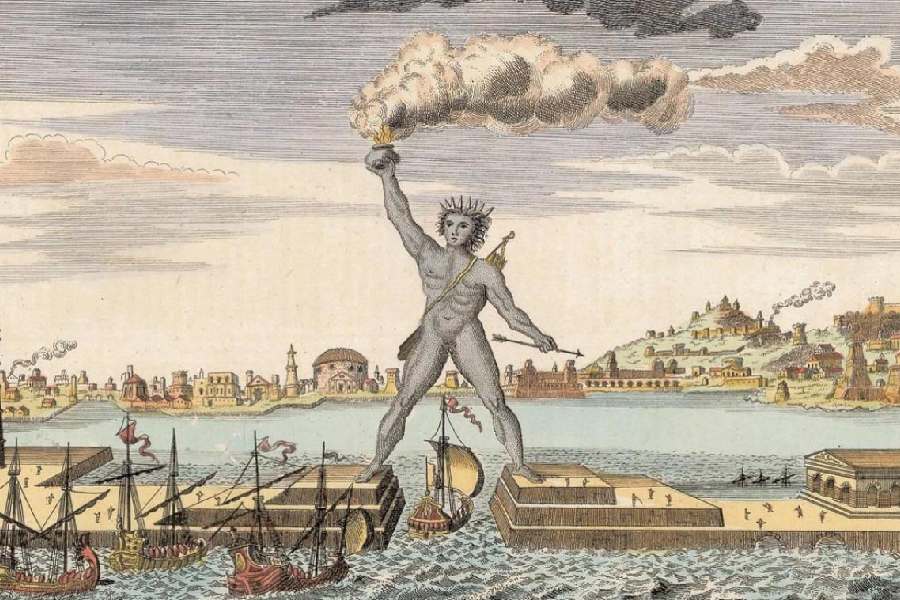Book: THE SEVEN WONDERS OF THE ANCIENT WORLD
Author: Bettany Hughes
Published by: W&N
Price: Rs 1099
To wonder is to think, to wonder is to behold in awe. These two threads are entwined in Bettany Hughes’s illuminating book. This wonderment stems not only from the dimensions and the grandeur of the seven wonders of the ancient world or the intricacies and richness of their interiors but also from the daring of the human imagination, its leaps of ingenuity, and the sustained brilliance and precision of their construction. Whether to commemorate a ruler, express geopolitical power, or be emblematic of an entire society, the Ancient Seven Wonders are time capsules into the past that link our shared heritage. They have left an indelible imprint on history and inspired later generations to manifest their own civilisations through similar monuments.
Little wonder then that the only surviving member of the original seven, the Great Pyramid at Giza, remains one of the most visited tourist sites worldwide. Constructed for King Khufu, it symbolises the ancient Egyptian notion that balance, harmony and mathematical systems govern the world. Ironically, the exact location of the most famous Ancient Wonder, the Hanging Gardens of Babylon, supposedly built by Nebuchadnezzar, remains undiscovered; there is an ongoing debate over whether they were situated further north at Nineveh. These gardens provide inspiration for latter-day pleasure palaces or sacred groves of enlightenment.
Overcoming debilitating arson by Herostratus and rebirth spurred by Croesus’ gold, the Temple of Artemis at Ephesus was famed for its beauty and revered for the sanctuary it provided. The ferocity and the fervour of its devotee Amazons instilled awe and fear in equal measure, in tune with the heady nature of Goddess Artemis herself. The Statue of Zeus, Artemis’ father, at Olympia, would tower over the ancient Olympic Games, an embodiment of virility, athletic excellence, and individual glory. The Mausoleum of Halikarnassos for King Mausolos in southern Turkey made fashionable the building of great tombs for eminent leaders in the centuries thence.
Raised in honour of the sun god, Helios, the Colossus of Rhodes was the largest statue constructed in antiquity and embellished human belief in the grandeur of the gargantuan. Similarly, the Pharos Lighthouse at Alexandria guided mariners on the Mediterranean and, together with Alexandria’s Great Library, lit both paths and minds. While earthquakes and war have claimed these monuments, their enduring legacies ensure a lasting, inter-generational immortality.
Several Wonder-lists now exist, be they of the new Seven Wonders, the list of Unesco World Heritage Sites, or nationalistic and faith-driven compilations. Yet, all such lists stem from the original Laterculi Alexandrini, prepared at the height of Hellenistic military might through Alexander’s exploits and the diffusion of its culture around the Mediterranean and across the Middle East, where the number, seven, held mythical and religious significance. The book is replete with detailed maps of these seven sites, their photographs and re-imaginations. A succinct timeline of historical events around the Mediterranean contextualises their construction, devastation by natural disasters or pillage, the rise and fall of empires around them, and their reappropriation by those seeking iconic greatness.
Their representations in historical and present-day cultural artefacts affirm that these seven structures continue to permeate through time and stoke imaginations worldwide. Hughes contends that these Ancient Wonders denote that great civilisations leave behind powerful ideas and enable the furtherance of human thought. Eminently readable, being both a travelogue and a scholarly account infused with the latest archaeological discoveries, the book is a fascinating adventure into the past, inducing wonder at the limitless bounds of human imagination and its pursuit of
perfection.











